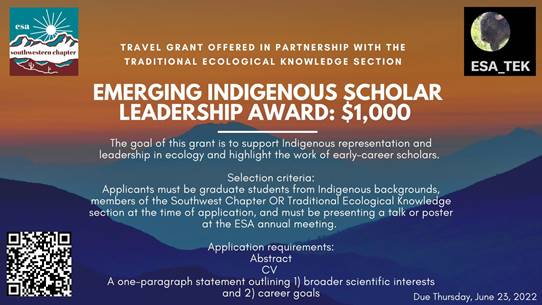ESA Announces Emerging Indigenous Scholar Leadership Award

WCS Co-authors Study on Climate Adaptation
NC CASC consortium partner, Wildlife Conservation Society (WCS), has co-authored a study on climate adaptation, "Strengthening monitoring and evaluation of multiple benefits in conservation initiatives that aim to foster climate change adaptation".
NC RISCC Network Share First Management Challenge: " Invasive Grass-Fire Cycle in the North Central US"
The North Central Regional Invasive Species & Climate Change Network, NC RISCC, has shared its first Management Challenge, " Invasive Grass-Fire Cycle in the North Central US".
Brian Miller to Co-present "Scenario Planning as a Climate Change Adaptation Tool" webinar
NC CASC/USGS Research Ecologist Brian Miller, Gregor Schuurman, NPS Climate Change Response Program and Amy Symstad, USGS will co-present "Scenario Planning as a Climate Change Adaptation Tool" as part of the National Park Service (NPS) Natural Resource Stewardship and Science Monthly Webinars:
Wednesday, May 11, 2022
3:00 pm EDT / 2:00 pm CDT / 1:00 pm MDT / 12:00 pm PDT
Recent paper by Christy Miller-Hesed Explores Cultural Knowledge and Goals for Environmental Monitoring
Recent NC CASC Publications
NC CASC Webinar Series: Identifying Potential Landscapes for Conservation Across the Central Grasslands of North America: Integrating Keystone Species, Land Use, and Climate Change
Please join us for our next NC CASC Webinar Series webinar: Identifying Potential Landscapes for Conservation Across the Central Grasslands of North America: Integrating Keystone Species, Land Use, and Climate Change
Presented by: Ana Davidson, Colorado Natural Heritage Program, Colorado State University
When: Thursday, May 12, 2022, 11a -12p MDT
When
Graduate Student Mentors Needed for Summer 2022 USGS CAST Program
The North Central Climate Adaptation Science Center (NC CASC) seeks 3 graduate student mentors to provide peer mentoring to 3 summer undergraduate research fellows. This is a part-time, hourly position, for approximately 4 hours per week from May 23 to July 29, 2022. Grad student mentors will be paid hourly based on current CU grad student pay rates for Student Assistant IV - Paraprofessional ($18.20-$31.00 depending on level of education and experience).
NC CASC April 2022 Tribal Climate Newsletter Now Online
The NC CASC April 2022 Newsletter is now available to read online.
Contact Us
Want to see more? Do you have feedback? Was this site helpful? Send us an email!

